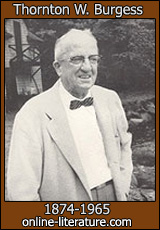 Subscribe for ad free access & additional features for teachers. Authors: 267, Books: 3,607, Poems & Short Stories: 4,435, Forum Members: 71,154, Forum Posts: 1,238,602, Quizzes: 344
Subscribe for ad free access & additional features for teachers. Authors: 267, Books: 3,607, Poems & Short Stories: 4,435, Forum Members: 71,154, Forum Posts: 1,238,602, Quizzes: 344
Chapter 31
WHAT FARMER BROWN'S BOY DID WITH SHADOW
Ribble, dibble, dibble, dab!
Some people have the gift of gab!
Some people have no tongues at all
To trip them up and make them fall.
Happy Jack.
It is a fact, one of the biggest facts in all the world, that tongues make the greatest part of all the trouble that brings uncomfortable feelings, and bitterness and sadness and suffering and sorrow. If it wasn't for unruly, careless, mean tongues, the Great World would be a million times better to live in, a million times happier. It is because of his unruly tongue that Sammy Jay is forever getting into trouble. It is the same way with Chatterer the Red Squirrel. And it is just the same way with a great many little boys and girls, and with grown-ups as well.
When the little people of the Green Forest and Green Meadows who fear Shadow the Weasel found that he was a prisoner, many of them took particular pains to visit him when the way was clear, just to make fun of him and tease him and tell him that they were not afraid of him and that they were glad that he was a prisoner, and that they were sure something dreadful would happen to him and they hoped it would. Shadow said never a word in reply. He was too wise to do that. He just turned his back on them. But all the time he was storing up in his mind all these hateful things, and he meant, if ever he got free again, to make life very uncomfortable for those whose foolish tongues were trying to make him more miserable than he already felt.
But these little people with the foolish tongues didn't stop to think of what might happen. They just took it for granted that Shadow never again would run wild and free in the Green Forest, and so they just let their tongues run and enjoyed doing it. Perhaps they wouldn't have, if they could have known just what was going on in the mind of Farmer Brown's boy. Ever since he had found Shadow in the trap which he had set for him in the henhouse, Farmer Brown's boy had been puzzling over what he should do with his prisoner. At first he had thought he would keep him in a cage the rest of his life. But somehow, whenever he looked into Shadow's fierce little eyes and saw how unafraid they looked, he got to thinking of how terrible it must be to be shut up in a little narrow cage when one has had all the Green Forest in which to go and come. Then he thought that he would kill Shadow and put him out of his misery at once.
"He killed my pullets, and he is always hunting the harmless little people of the Green Forest and the Green Meadows, so he deserves to be killed," thought Farmer Brown's boy. "He's a pest."
Then he remembered that after all Shadow was one of Old Mother Nature's little people, and that he must serve some purpose in Mother Nature's great plan. Bad as he seemed, she must have some use for him. Perhaps it was to teach others through fear of him how to be smarter and take better care of themselves and so be better fitted to do their parts. The more he thought of this, the harder it was for Farmer Brown's boy to make up his mind to kill him. But if he couldn't keep him a prisoner and he couldn't kill him, what could he do?
He was scowling down at Shadow one morning and puzzling over this when a happy idea came to him. "I know what I'll do!" he exclaimed. Without another word he picked up the cage with Shadow in it and started off across the Green Meadows, which now, you know, were not green at all but covered with snow. Happy Jack watched him out of sight. He had gone in the direction of the Old Pasture. He was gone a long time, and when he did return, the cage was empty.
Happy Jack blinked at the empty cage. Then he began to ask in a scolding tone, "What did you do with him? What did you do with him?"
Farmer Brown's boy just smiled and tossed a nut to Happy Jack. And far up in the Old Pasture, Shadow the Weasel was once more free. It was well for Happy Jack's peace of mind that he didn't know that.
| Art of Worldly Wisdom Daily In the 1600s, Balthasar Gracian, a jesuit priest wrote 300 aphorisms on living life called "The Art of Worldly Wisdom." Join our newsletter below and read them all, one at a time. |
Sonnet-a-Day Newsletter Shakespeare wrote over 150 sonnets! Join our Sonnet-A-Day Newsletter and read them all, one at a time. |
